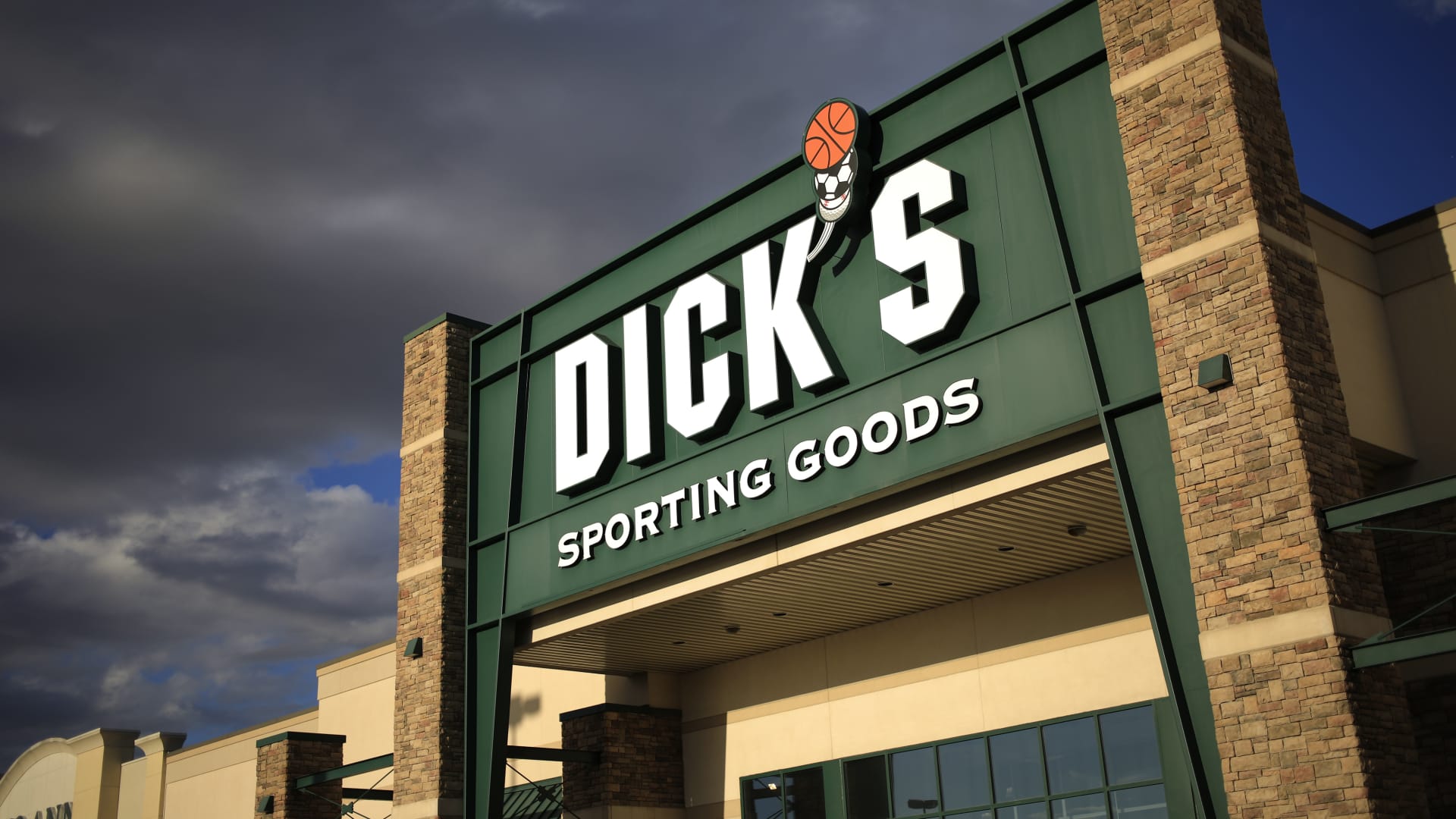Dick’s Sporting Goods reported a 23% drop in profits and slashed its earnings guidance for the year after it saw an uptick in retail theft and slow sales in its outdoor category, the company announced Tuesday.
For the first time in three years, Dick’s fell short of Wall Street’s estimates on the top and bottom lines. It also announced cuts to its global head count. The company’s shares fell about 20% in premarket trading.
Here’s how the company did in its second fiscal quarter compared with what Wall Street was anticipating, based on a survey of analysts by Refinitiv:
- Earnings per share: $2.82 vs. $3.81 expected
- Revenue: $3.22 billion vs. $3.24 billion expected
The company’s reported net income for the three-month period that ended July 29 was $244 million, or $2.82 per share, compared with $318.5 million, or $3.25 per share, a year earlier.
Sales rose to $3.22 billion from $3.11 billion a year earlier.
The company lowered its profit forecast for the year in part because it expects shrink, a retail industry term that refers to inventory lost by theft or internal issues, to get worse before it gets better.
“Our Q2 profitability was short of our expectations due in large part to the impact of elevated inventory shrink, an increasingly serious issue impacting many retailers,” CEO Lauren Hobart said in a news release. “Despite moderating our 2023 EPS outlook, the enthusiasm we have for our business and the confidence we have in our long-term growth opportunities have never been stronger.”
Dick’s now expects earnings of $11.33 to $12.13 per share for the year, compared with previously issued guidance of $12.90 to $13.80. It reaffirmed its comparable store sales forecast of flat to up 2% and isn’t cutting its planned capital expenditures. Despite the profit loss during the quarter, the retailer still expects gross margins to increase for the full year compared with 2022.
The reference to shrink is the first that Dick’s has made in an earnings call or press release in nearly 20 years, according to FactSet. Similar to other retailers that reported earnings last quarter, the reference comes at a time that Dick’s profits are under pressure from numerous sources, including a slowdown in its outdoor category, which includes hard goods like camping equipment.
During the quarter, Dick’s used promotions to offload inventory from the category. Overall, inventories were down about 5% in the quarter compared with the year ago period.
Dick’s gross margins fell to 34% compared with 36% in the year ago period. Analysts had been expecting gross margins of 36%, according to StreetAccount.
Chairman Ed Stack told CNBC about a third of its margin reduction was from shrink.
“It’s moved. It’s kind of gone up. We expect it could even get a little bit worse. We’ve taken a little bit bigger reserve for that in the second half of the year. Just because what we see going on with organized retail crime, grab and go’s,” Stack said in an interview. “We think we’re doing the best we can to try to curtail it with the security that we have in the stores, working with local authorities.”
Earlier this month, CNBC published a three-part series on organized retail crime that examined the claims retailers make about it and the action companies and policymakers are taking to combat it. While retail crime is a serious concern, it’s a metric that’s nearly impossible to accurately count and one retailers aren’t required to disclose. Experts said that some retailers could be using theft as a crutch to obscure internal challenges, such as promotions and bloated inventory levels.
Holding on to pandemic gains
While the quarter is a bit rough compared with Dick’s usual reports, the retailer is still holding on to its Covid pandemic gains. Its profits are up compared with 2019. It opened seven new House of Sport locations during the quarter and plans to continue opening new doors ahead. The sprawling specialty stores, which are up to 100,000-square-foot facilities, are interactive and geared toward its athlete customer base.
Same-store sales were up 1.8% in the quarter, compared with down 5.1% in the year-ago period, and were driven by a 2.8% uptick in transactions. Analysts had been expecting them to be up 2.7%, according to StreetAccount.
In a bid to streamline its cost structure and reinvest in different parts of the business, the company cut less than 1% of its global workforce on Monday, primarily at its customer support center. The cuts largely impacted headquarter roles and account for less than 10% of corporate positions, Stack said.
The cuts will cost about $20 million in severance expenses in the next quarter and may result in additional one-time charges of $25 million to $50 million.
Stack cautioned that the cuts were not a cost-saving strategy but rather an attempt to reallocate resources.
“We are going to reinvest all of these dollars back into talent and the technology that we want,” said Stack. “So this was not a cost-cutting move.”
— CNBC’s Courtney Reagan contributed to this report
